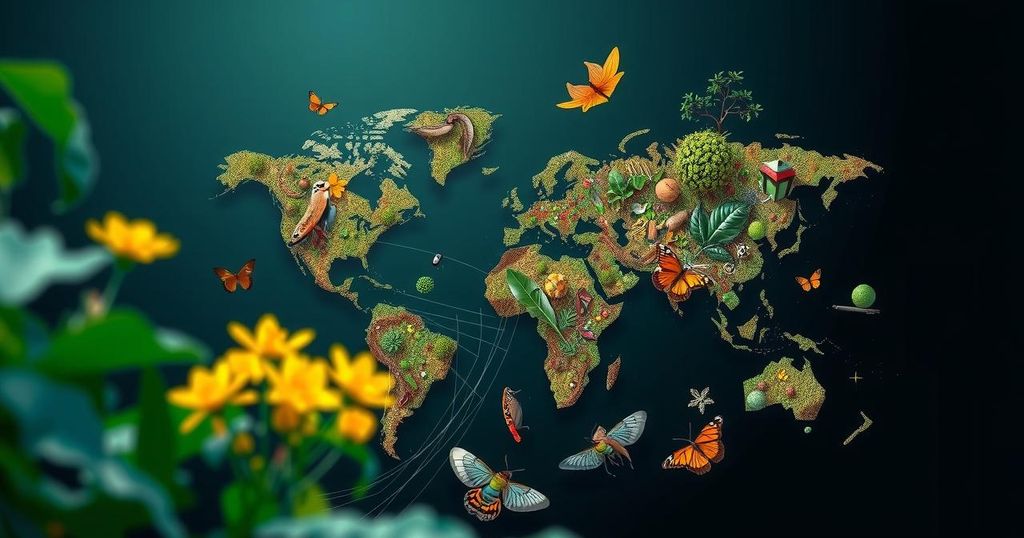Unified Efforts Required to Address Biodiversity Loss and Climate Change at COP16

The 16th Conference of the Parties (COP16) to the Convention on Biological Diversity will take place from October 21 to November 1, 2024, in Cali, Colombia. The International Fund for Animal Welfare (IFAW) calls for strong international collaboration to address the interconnected crises of biodiversity loss and climate change. Key themes include the need to align strategies at all levels and prioritize the protection of marine ecosystems. IFAW will also host a side event focusing on integrating wildlife conservation into climate strategies.
The 16th Conference of the Parties (COP16) to the Convention on Biological Diversity (CBD) is set to take place from October 21 to November 1, 2024, in Cali, Colombia. This gathering of global leaders and environmental specialists comes at a critical juncture, as the International Fund for Animal Welfare (IFAW) emphasizes the urgent need for cohesive international efforts to confront the intertwined crises of biodiversity loss and climate change. According to Matt Collis, IFAW’s Senior Director of Policy, these two challenges cannot be effectively addressed in isolation. COP16 presents a crucial opportunity to synchronize national and global strategies aimed at both protecting biodiversity and mitigating climate change, establishing a foundation for future initiatives. As the inaugural meeting of the Rio Convention COPs in 2024, COP16 holds the potential to influence forthcoming global environmental discussions, including the pivotal UNFCCC COP30, where nations will be expected to revise their climate action plans. The 2023 COP28 Joint Statement, endorsed by the leaders of the Rio Conventions and other international coalitions, underscores the necessity of a coordinated approach to these pressing issues. Marine and coastal biodiversity protection remains a critical aspect of this unified action, given its essential role in supporting ecological balance and regulating the climate. Marine ecosystems are vital for carbon absorption and the stabilization of weather conditions; however, they are under severe threat from human activities and climate fluctuations. As emphasized by Collis, “Healthy oceans are the foundation of a healthy planet. They absorb carbon, mitigate climate impacts, and support rich biodiversity.” As such, protecting these ecosystems must be a priority during COP16 to ensure their continued contribution in combating climate change. Collis further stated, “Time is running out to tackle the intertwined crises of biodiversity loss and climate change, but COP16 offers hope.” He advocates for integrated approaches that align biodiversity and climate efforts across various levels of governance, reinforcing the idea that meaningful advancement is possible. IFAW is hosting a significant side event titled “Leveraging wildlife conservation and rewilding to supercharge climate mitigation and adaptation” on October 24 at 16:30 COT. This session will delve into the crucial role that wildlife conservation plays in addressing climate challenges and will introduce new guidelines for policymakers on incorporating wildlife strategies into climate agendas. Interested parties can find further details at the provided link.
The Convention on Biological Diversity (CBD) is an international treaty aimed at conserving biodiversity, promoting sustainable use of its components, and ensuring the fair distribution of benefits arising from genetic resources. COP16 will mark a significant moment in the ongoing efforts to address the dual crises of climate change and biodiversity loss, which pose substantial threats to ecosystems and human well-being. In recent years, the links between biodiversity and climate change have been increasingly recognized, underscoring the importance of a unified approach to safeguard natural habitats while simultaneously working towards climate mitigation strategies. Upcoming global events, such as COP30 under the UNFCCC, frame the discussions at COP16, as nations are urged to align their climate commitments with biodiversity preservation goals in their national plans. The protection of marine ecosystems, which are vital for both climate regulation and biodiversity, is particularly highlighted as a critical area requiring cohesive action.
The upcoming COP16 represents a pivotal occasion for global leaders to unite in addressing the interrelated crises of biodiversity loss and climate change. As emphasized by the International Fund for Animal Welfare, effective collaboration is essential for crafting comprehensive solutions that encompass both biodiversity and climate strategies. The importance of marine ecosystems cannot be overstated, making their protection a fundamental aspect of any future initiatives. Moving forward, aligning national and international commitments will be key to fostering a sustainable future for our planet.
Original Source: www.ifaw.org








